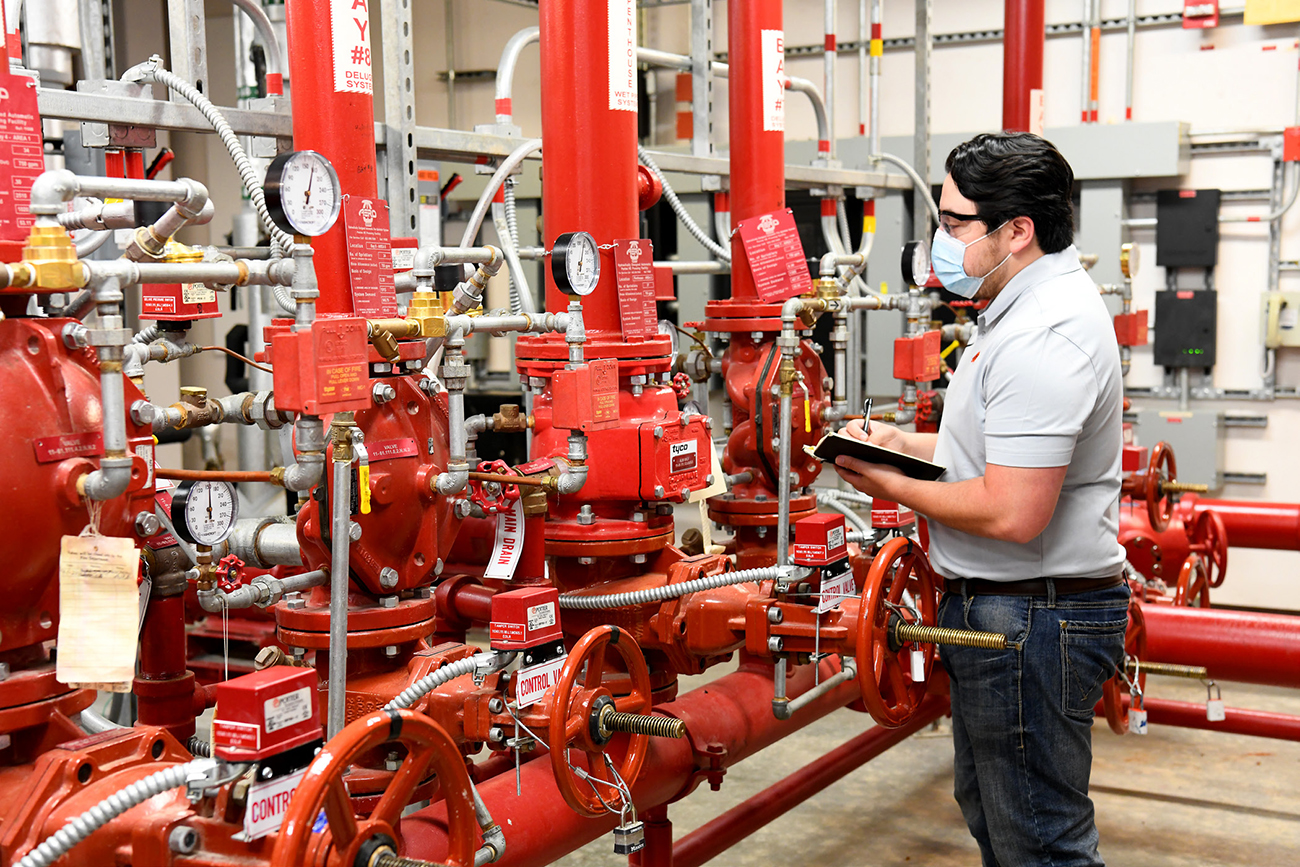Fire Protection Engineering Specialization and Certificate Program
Undergraduate:
Students must take 12 hours listed below to satisfy requirements of certificate program.
MENG 4370 - Fire Protection Engineering Principles
An introduction to fire protection, conceptually and professionally with emphasis on governing principles and primary sources of requirements: Code enforcement, interpretation, and application applied throughout the course. Major topics include fire protection principles, occupancy classification, hazardous materials classifications, egress and life safety, structural fire protection, and performance based design. Comprehensive study of fundamental engineering concepts, principles. Systematic approach to problem solving.
MENG 4371 - Fire Detection and Suppression
Prerequisite(s): MENG 4304. This course engages in principles of fire suppression and detection. Specific topics included manual fire suppression, water supply systems, fire pumps, water based suppression systems, special hazard systems, smoke and flame detection, and notification. Fluid properties; conservations of energy and momentum; incompressible flow in pipes; Bernoulli equation; standard symbols; components and control of hydraulic systems and pneumatic systems.
MENG 4372 - Fire Dynamics
Course engages in the fundamentals of fire and combustion. Content includes thermodynamics of combustion, fire chemistry, premixed and diffusion flames, solid burning, ignition, plumes, heat release rate curves, and flame spread. On this basis, participants then develop models for compartmental fire behavior, pre and post flashover conditions and zone modeling. Theory and principles of rigid body kinematics, including forces, acceleration, work and energy, and impulse and momentum, in rectilinear and curvilinear systems. Pre requisites: MENG 3304 and 3320
MENG 4380 - Mechanical Engineering Design (HAZ)
Prerequisite(s): senior classification; MENG 4350 or MENG 4352; and instructor consent. A project will be selected by the student to work as part of a student team, subject to faculty approval. The project will integrate theory and application of the engineering curriculum and incorporate all aspects of the design/research process. Final oral and written reports are required. Capstone course intended to be taken in the final semester.
Graduate:
Students must take 12 hours listed below to satisfy requirements of certificate program.
MENG 5370 - Fire Protection Engineering Principles
An introduction to fire protection, conceptually and professionally with emphasis on governing principles and primary sources of requirements: Code enforcement, interpretation, and application applied throughout the course. Major topics include fire protection principles, occupancy classification, hazardous materials classifications, egress and life safety, structural fire protection, and performance based design. Comprehensive study of fundamental engineering concepts, principles. Systematic approach to problem solving.
MENG 5371 - Fire Detection and Suppression
Prerequisite(s): MENG 4304. This course engages in principles of fire suppression and detection. Specific topics included manual fire suppression, water supply systems, fire pumps, water based suppression systems, special hazard systems, smoke and flame detection, and notification. Fluid properties; conservations of energy and momentum; incompressible flow in pipes; Bernoulli equation; standard symbols; components and control of hydraulic systems and pneumatic systems.
MENG 5372 - Fire Dynamics
Course engages in the fundamentals of fire and combustion. Content includes thermodynamics of combustion, fire chemistry, premixed and diffusion flames, solid burning, ignition, plumes, heat release rate curves, and flame spread. On this basis, participants then develop models for compartmental fire behavior, pre and post flashover conditions and zone modeling. Theory and principles of rigid body kinematics, including forces, acceleration, work and energy, and impulse and momentum, in rectilinear and curvilinear systems. Pre requisites: MENG 3304 and 3320
Must Select one of the following:
MENG 6321 Combustion Theory
MENG 6360 Advanced Fluid Mechanics
MENG 6361 Microfluidics
MENG 6397 Advanced Mechanical Engineering Problems (only if project is FPE)
Note: Fire Protection Engineering will be denoted on your transcript!
Newsroom

